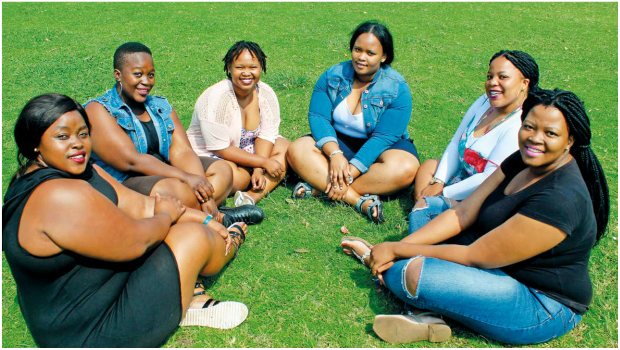They’re used to being called names, being pointed at and ridiculed by strangers. They also know what it feels like to be humiliated when they take public transport and are made to feel ashamed of the size of their bodies.
Which is why they decided to take back the power from the body shamers and start an online support group for big women – and the name they’ve given it is a hefty “we’ll show you” to all the bullies out there. It’s called Fat and Ugly, and by calling themselves this the words no longer have power over them, says group founder Noxolo Mchunu (22), who’s from Richards Bay in KwaZulu-Natal.
“We’re sending a strong message to our haters. We’re using the same words people used to hurt us to our own advantage. “We now understand words can only hurt you if you allow them to. The reality is we’re beautiful and comfortable in our bodies.
“We do exercise and eat healthily but obviously our bodies are meant to be like this.” The bullying over her weight started when she was in primary school, Noxolo says, and it was difficult to deal with. “What’s funny is when I was young everyone seemed to love my chubbiness.
Things changed when I entered adolescence and people started calling me names and picking on me. “At one point I played basketball and I was good at it but I was taken off the team because of my weight,” she recalls. “That made me sad.” Noxolo and her friends want to put an end to name-calling, especially when it comes to vulnerable kids, and they plan on visiting schools to teach kids to love themselves as they are – without looking for validation from others.
FAT and Ugly group members motivate one another on WhatsApp as well as their Facebook page, where they share their experiences. “Our message to society is we’re here to stay,” says Noxolo, who’s a size 46.
The group has attracted hundreds of people from all over the country and there are new requests for membership daily, she says,. Opening this group wasn’t a spur-of -the-moment decision; it came from years of abuse – and sometimes hurtful comments come from the people closest to you.
“We’ve been called ugly names by our own families. They pass nasty comments about weight without even realising the hurt they’re causing us.” Thobeka Mahlase (19) says she didn’t think of herself as different until she started taking public transport.
“Once I was sitting in the front of a taxi and when the driver got inside he rudely said, ‘You’re too fat and blocking my view. Just go and sit at the back’.” She felt insulted and embarrassed at the same time, Thobeka says.
“Weeks later I had a similar experience with another taxi driver. I was on my way to school and I chose to sit right behind the driver’s seat. “The driver’s assistant told me to get out because I was taking up space meant for two people.”
These were her first experiences with body shaming and they stuck with her. “My mother always taught me to be confident and I’d never had any negative remarks before.” Fat and Ugly members share stories that made them join the group. Yolisa Ntshantshane (21) of Mthatha weighs 101kg and says her neighbours have never let her forget it.
“I’m the only big person in my family. Whenever I was out playing with other kids my neighbours would be shouting at me saying, ‘Hey, gibhagibha or Hey, sdudla [fat one]’. That hurt a lot.”
She recalls auditioning for a play in school but not getting the part due to her weight. “Instead they chose another girl and made me to do a voice-over for her.” But joining Fat and Ugly has helped A NDILE Nsele (20) of Richards Bay weighs 95kg and only started gaining weight after adolescence.
The worst body shaming and the most hurtful comments about her size have come from her family, she says. “Every time I go home they remind me that I’ve gained weight and tell me to eat less. This hurts because I don’t really want to be slim – I love my body as it is.” She’s embracing the Fat and Ugly label now. “Our intention is to take the negativity out of these words,” Andile says.
Another group member, Lindiwe Ndlovu (21), says she’s learnt to shrug off the insults that have been hurled at her since she was a child. “I was called umabefu, stufuluza, tsekeleke – all nicknames meaning ‘the fat one’.
That used to hurt because I was too young to defend myself. “But over the years I’ve gained self confidence and I’ve accepted my body now.” For Nontokozo Dlamini (21) of Pinetown near Durban, her worst experiences of body shaming came from fellow university students. “They would just point and laugh at me. I decided to stop eating at the cafeteria because other students would look at me as if I was doing something wrong. I ended up spending more time in the library to avoid other people.”
This is why she believes the Fat and Ugly initiative is so important – it helps you come to terms with who you are and makes you feel part of a community. She hopes other young women who have the same issues will join too. “We’re here to support one another,” she says. Sbahle Mzinyathi (24) was also called names when she reached tertiary education level.
“Fortunately, my family is very supportive so I had no time for the haters,” she says. “Women like me are tired of being labelled fat and ugly. We have decided to take the same weapon and use it to fight right back. “The aim is to destroy the negative stereotype associated with being fat.” And they seem to be doing it – one motivational post at a time.
Source: W24



